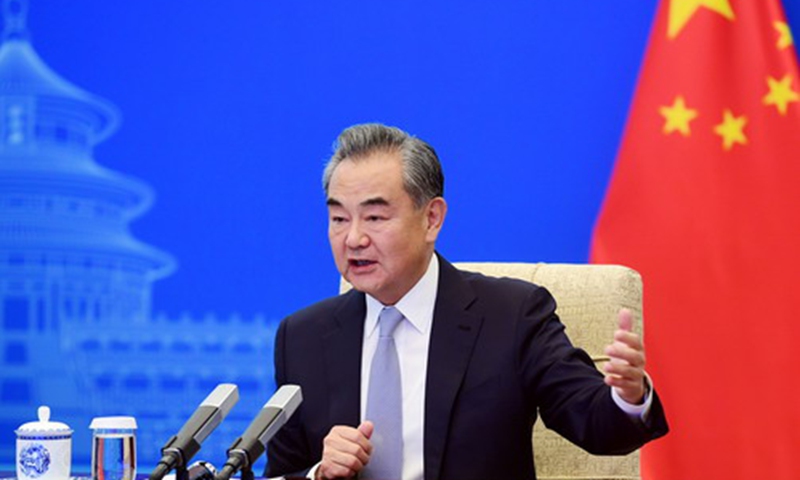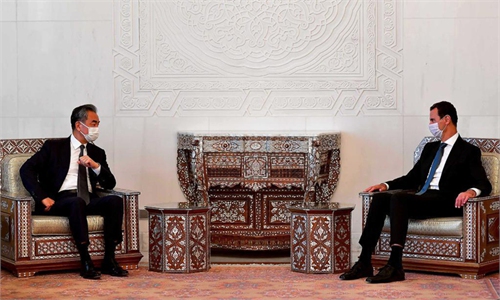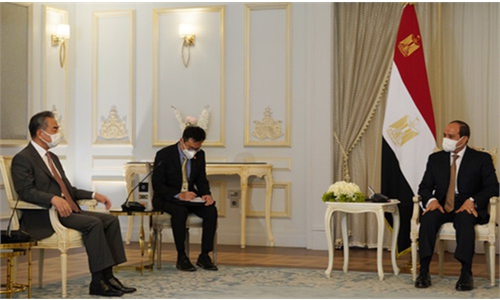Wang Yi's Middle East visit enhances anti-terrorism cooperation, lifts strategic ties

Chinese State Councilor and Foreign Minister Wang Yi Photo: fmprc.gov.cn
As the second stop in his Syria-Egypt-Algeria visits from Saturday to Tuesday, Chinese State Councilor and Foreign Minister Wang Yi finished his Egypt trip on Monday, which experts said enhanced friendship and outlined responsibility of China as an influential power, amid US confrontational moves and world chaos.
Wang met with Egyptian President Abdel Fattah al-Sisi on Sunday, and highly appreciated the prospect of bilateral cooperation in anti-COVID and counter-terrorism efforts, and the Belt and Road initiative (BRI).
A joint statement was released after Wang's meeting with Arab League Secretary-General Ahmed Aboul-Gheit in Alamein on Sunday, which emphasized the need to continue to support each other on issues concerning each other's core interests and major concerns.
The two sides also called for the convening of a more authoritative and broadly representative international conference to realize a just and lasting peace in the Middle East on the basis of the "two-state solution" for the Israel and Palestinian issue as soon as possible.
In the joint statement, the two sides agreed to make preparations for the first China-Arab Summit scheduled for 2022 in Saudi Arabia, expecting it to lift the China-Arab strategic partnership to a new level to serve the common interests of both sides, the Xinhua News Agency reported on Monday.
The preparation of the first China-Arab summit may be the top priority among these subjects, experts told the Global Times. China and the Arab League are preparing for the new, upgraded mechanism, a leap from ministerial to summit level, said Liu Zhongmin, a professor at the Middle East Studies Institute of the Shanghai International Studies University.
"The ministerial meeting, the China-Arab States Cooperation Forum (CASCF), has been held for nine years. The China-Arab Summit is not only a new mechanism, but also an upgrade of the CASCF. And both mechanisms will exist in the future," Liu said.
Wang's visit is intended to further cement China's call for a new type of international relations and a community of shared future for mankind (a community of health, civilization and development), Zhu Weilie, director of the Middle East Studies Institute of the Shanghai International Studies University, told the Global Times on Monday.
The three countries on Wang's list of visit were all affected by the "Arab Spring" a decade ago, when the Arab world saw waves of protests and riots.
The problem of the Arab Spring, in essence, is the question of development, Liu said, noting the region is an important hub of the Belt and Road Initiative (BRI). So promoting infrastructure construction and even new fields of cooperation such as aerospace and digital science and technology would also be discussed during Wang's visit.
Experts also mentioned that given the recent terrorist attacks on Chinese citizens in Pakistan, the discussions between China and Egypt on counter-extremism and terrorism came out of a realistic need to protect China's overseas interests.
Egypt had played a pivotal role in mediating Palestinian-Israeli conflicts. Egypt is also regarded as a proper partner for China in easing conflicts in the Middle East and cooperating with Arab countries in fighting the epidemic.
Since the COVID-19 outbreak last year, Saudi Arabia, Egypt and other Arab countries have sent medical supplies to China. After China recovered, it set up vaccine production lines in the United Arab Emirates and Egypt, and could supply the vaccine to neighboring countries.
During his visit to Egypt, Wang attended a ceremony marking the production of 1 million doses of the China-Egypt COVID-19 vaccine cooperative production project.
In recent years, the US has been constantly pressing the Arab world to take a side regarding COVID-19 origins tracing and China's internal affairs.
Zhu said the Arab world has given great support to China on its core interests like issues related to Xinjiang, Hong Kong, Taiwan and human rights.
"The mutual trust between China and the Arab world cannot be matched by the US," Zhu said.
China's global diplomacy is not a passive response, but a proactive and advanced plan, showing China hopes friendship can continue to grow, Zhu noted.



